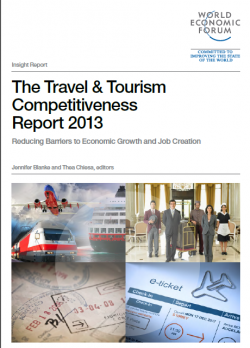- Home
- |
- About Us
- |
- Working Groups
- |
- News
- |
- Rankings
- WEF-Global Competitiveness Report
- Ease of Doing Business Report
- IMD-World Competitiveness Yearbook
- TI-Corruption Perceptions Index
- HF-Economic Freedom Index
- WEF-Global Information Technology Report
- WEF-Travel and Tourism Report
- WIPO-Global Innovation Index
- WB-Logistics Performance Index
- FFP-Fragile States Index
- WEF-Global Enabling Trade Report
- WEF-Global Gender Gap Report
- Gallery
- |
- Downloads
- |
- Contact Us
Phl competitiveness rank up 12 notches in WEF report (PhilStar)

The international community has acknowledged the recent government efforts to revitalize the local travel and tourism industry as the Philippines proved to be the only ASEAN nation that registered double-digit improvement, advancing to 12 notches in the 2013 Travel & Tourism Competitiveness Report by the World Economic Forum (WEF).
Out of the 140 economies covered by the study, the Philippines was listed as “the most improved country in the region, ranking 16th regionally and 82nd overall”.
The country jumped 12 spots, up from 94th rank in the last report in 2011.
The competitiveness index is calculated based on three categories such as regulatory framework; business environment and infrastructure; and human, cultural, and natural resources.
The report has recognized that the country has significantly raised its rank in prioritization of travel and tourism from 70th to 15th and has now ranked as first in the world in terms of government spending on the industry as compared to its 63rdplace in the 2011 report.
Other key improvements for the Philippines that were cited include the country’s effectiveness of its marketing campaigns from 99th to 85th, natural resources at 44th rank and price competitiveness at 24th rank to continue to keep the industry strong.
Favorable policies on protection of property rights, openness towards investments, and few visa requirements at 7th spot also make it attractive to foreigners.
On the other hand, the cost of starting a business, number of days to start a business, safety and security, inadequate health and hygiene, and poor infrastructure are among those identified as major obstacles to the country’s industry competitiveness.
In its latest press statement, the National Competitiveness Council (NCC) still expressed optimism that the Philippine travel and tourism industry remains positive despite such weaknesses.
NCC is a public-private sector body dedicated to building up the long-term competitiveness of the Philippines through policy reforms, project implementation, institution-building, performance monitoring and goal-setting.
“Efforts are underway to address these issues. We are optimistic that improvements will be visible in these areas in the near future,” NCC private sector co-chairman Guillermo Luz said.
NCC further lauded the efforts of the Department of Tourism, its related agencies and the private sector in promoting tourism and elevating the country’s tourism profile on the global stage.
The 2013 report was also found to have the same performance in the WEF Global Competitiveness Report released last September in which the Philippines jumped 10 spots in 2012.
Original Source: www.philstar.com

